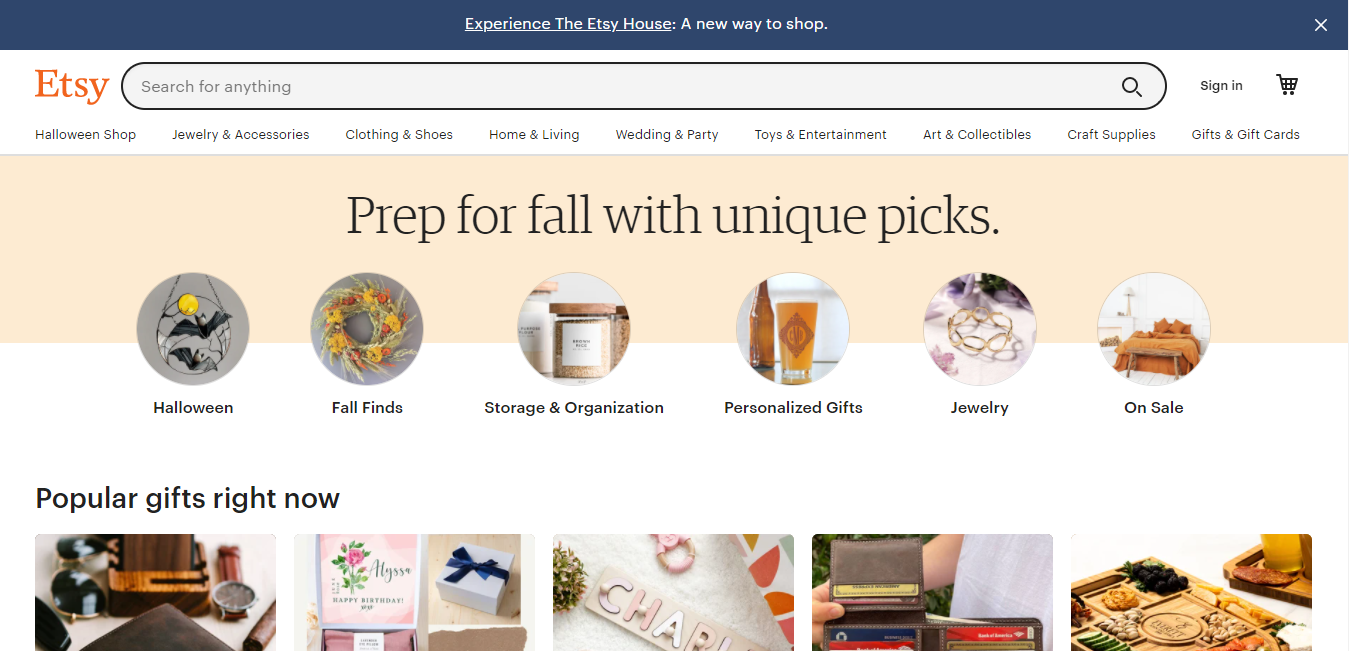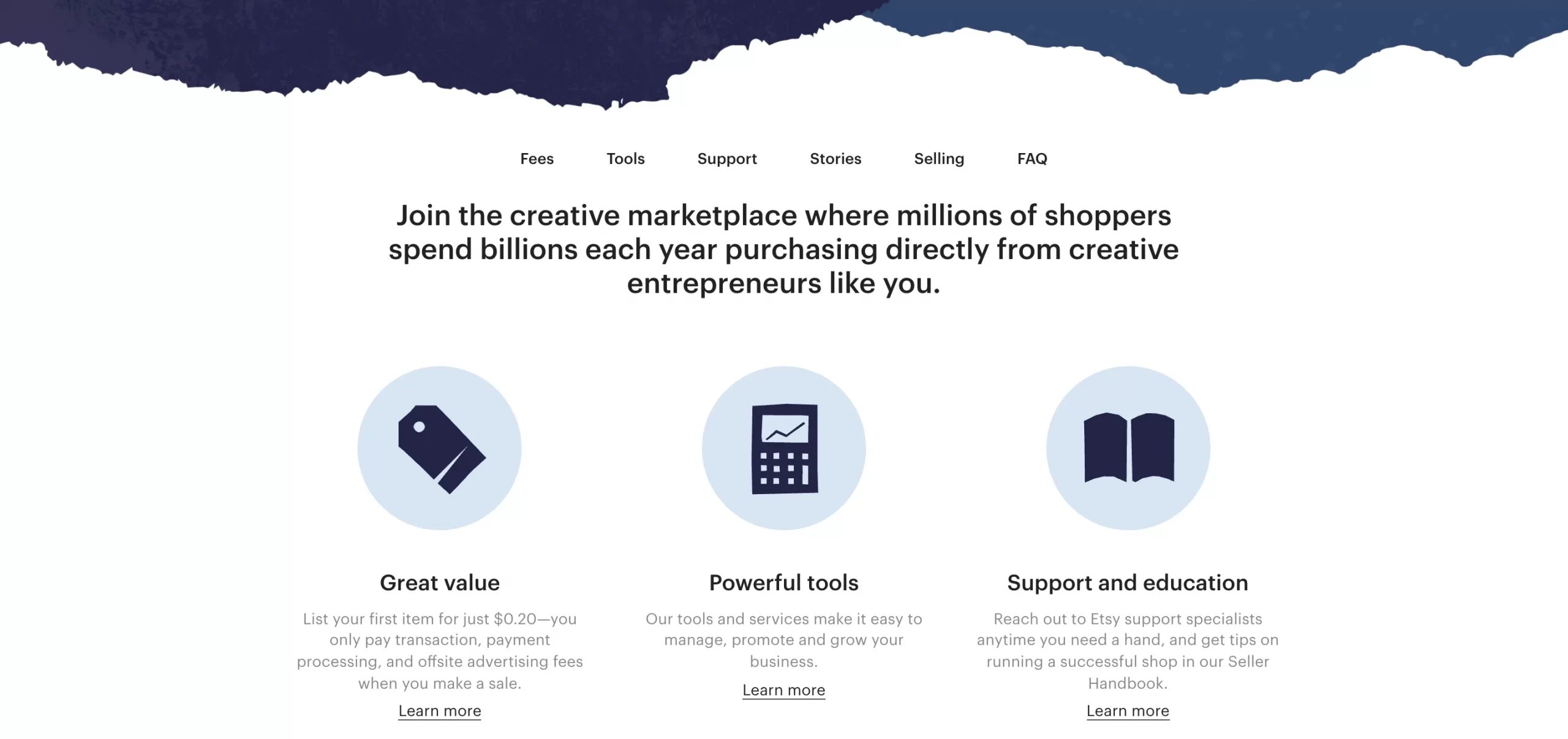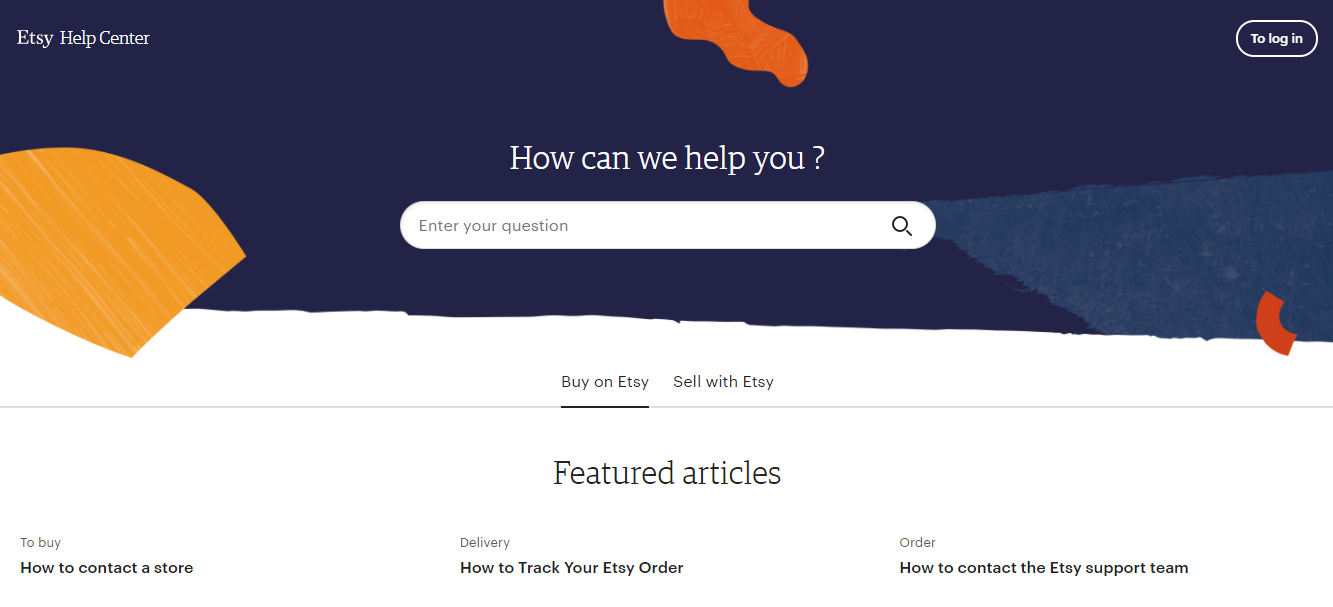If you are seeking an eCommerce solution for your first time selling online, you might find yourself stuck between several online marketplaces and eCommerce platform options like Shopify vs Etsy.
So, what do these top choices compare together? And what works better for your business? LitExtension, the #1 Shopping Migration Service, will address these concerns in the following lines.
Keep reading to see how the two platforms perform in terms of:
- Pricing
- Audience & reach
- Ease of use
- Design flexibility
- eCommerce features
- SEO & marketing
- Scalability
- Security
- Help & support
Without any delay, let's get straight away to it!
Shopify vs Etsy – An Overview
About Shopify
Shopify is a SaaS (Software as a Service) eCommerce solution founded in 2006 and has evolved to become one of the greatest eCommerce platforms ever since.
As of this writing, Shopify has powered 7,2+ million online stores worldwide (Source: BuiltWith). This platform is chosen by many corporations across various industries, including Gymshark and ColourPop Cosmetics (Fashion & Apparel), Brooklinen (Home & Living), Glossier (Health & Beauty), and many others.
It has been easy to use and very helpful in creating an effective online presence for my business. The platform is intuitive, allowing me to quickly create pages, customize designs, add products, manage payments and shipping options, as well as track analytics. – Patrick L., UK.
Here's a brief look at Shopify pros and cons:
Shopify Pros | Shopify Cons |
|
|
Best for: Shopify is best for sellers who want to build a long-term brand with full control over their storefront. Specifically, it’s a strong fit for businesses planning to scale, expand beyond one sales channel, and create a professional online presence that doesn’t rely on a marketplace audience.
About Etsy
Let's quickly move to Etsy! Some might wonder, “Is Etsy popular?” or “Is Etsy an eCommerce platform?”
Since its inception in 2005, Etsy has been a trendy marketplace. As of the first quarter of 2024, there are 91.6 million active buyers globally (Source: Statista). Did you know that Etsy is a treasure trove of unique and creative products?
There are so many talented Etsy sellers catering to various niches such as CaitlynMinimalist and MinimalVSBoho for jewelry, TheWhimsicalDoor for home decor, TheYarnKitchen for art & collectibles, and so much more. Etsy is an amazing place to find one-of-a-kind items!
In late 2016, Etsy Pattern, the website platform version of Etsy, was introduced. It allows customers to sell unique things on their own standalone websites. There are fewer product restrictions with Etsy Pattern than with the Etsy marketplace, and it's free to use for the first 30 days.
Etsy is like my creative haven! It's not just a platform; it's a warm community that celebrates uniqueness. The easy-to-use setup made it a breeze to share my creations with the world – John, US.
Here's a brief look at Etsy pros and cons:
Etsy Pros | Etsy Cons |
|
|
Best for: Etsy is best for beginners and creative sellers who want to start selling quickly and tap into a ready-to-buy audience. With more than 91.6 million active buyers globally, it’s especially ideal for handmade, vintage, and unique products – though you’ll also face higher competition and limited branding flexibility.
Shopify vs Etsy: Which Is Better?
Overall, Shopify is the better overall choice if you’re serious about building a long-term eCommerce business. It gives you full control over your brand, stronger selling tools, and more room to scale as you grow.
Nevertheless, Etsy remains a solid option for those who want to get started quickly inside an existing marketplace. To see exactly how Shopify vs Etsy compare across pricing, ease of use, design, and key selling features, check out the summary table below:
Features |  |  | Winner |
Pricing | • Free trial available. • 5 pricing plans: Starter, Basic, Grow, Advanced, Plus. | • Free to use with basic features (Etsy Standard) • Etsy Plus: $10/month | It's a draw! |
Ease of Use | • Simple to get started. • User-friendly with detailed checklist. | • A few steps required. • Provide guide through the process. | Etsy |
Audience and reach | You must build your own reach and audience | Access 91.6 million shoppers immediately | Etsy |
Design Flexibility | • Has a wider selection of modern and customizable themes. | • Follow Etsy design & layout. • No customization allowed. | Shopify |
Selling Online Features | • Numerous powerful eCommerce capabilties. • Multichannel selling, abandonded cart recovery and SSL certificates are included. | • Sell on Etsy app available. • Include a analytics report function. | Shopify |
Marketing Tools | • Easy to upgrade to Shopify Plus. • Attract traffic on own. | • Strong customer base. | Shopify |
Scalability | • Easy to upgrade to Shopify Plus. | • Etsy Plus comes with several powerful tools. | It's a draw! |
Security | • SSL certificates • Two-factor authentication (2FA) • Fraud analysis tools | • Etsy takes care of all the techy security stuff • Etsy has seller protection policies • Etsy handles most of the sensitive data and security stuff | Etsy |
Help & Support | • Abundant customer service support, 24/7. | • Help Center & active forum available. | Shopify |
Pricing – It's a Draw
Price is the most important factor when considering an eCommerce solution for your business, and the same is true when comparing Shopify vs Etsy. Is Shopify cheaper than Etsy? We'll find out in the following lines.
Before we start, it's worth noting that prices and fees are completely different in our Shopify vs Etsy comparison.
- Prices refer to the amount a merchant is willing to pay for the service (Shopify plans or Etsy packages)
- Fees imply the costs incurred during the sales process (listing fees, transaction fees, etc.)
Quick verdict
For the first round in our Shopify vs. Etsy comparison, it's a draw! Selling on Etsy requires no monthly running costs, but Shopify provides more excellent features and tools with its diverse pricing plans.
Shopify pricing
There are five Shopify pricing plans to choose from: Starter, Basic, Shopify, Advanced, and Shopify Plus. The higher the plan, the more features you'll have access to.
Basic | Grow (formerly Shopify) | Advanced | |
Monthly | $39 | $105 | $399 |
Annual (Save 25%) | $29 | $79 | $299 |
Transaction fees | 2.9% + 30¢ USD online 2.6% + 10¢ USD in person 2% 3rd-party payment providers | 2.7% + 30¢ USD online 2.5% + 10¢ USD in person 1% 3rd-party payment providers | 2.5% + 30¢ USD online 2.4% + 10¢ USD in person 0.6% 3rd-party payment providers |
In addition to the monthly subscription costs, Shopify charges transaction fees for each payment made in your store. These costs vary greatly depending on your Shopify pricing plan and your chosen payment method.
If you wish to use your familiar payment option, Shopify provides pre-integration to over 100 payment gateways, such as PayPal, Google Pay, Apple Pay, Stripe, and others. However, you will be charged transaction fees based on your subscription plan.
Here's in details:
- Basic Shopify plan: 2.9% + 30¢ per online transaction
- Grow plan: 2.6% + 30¢ per online transaction
- Advanced Shopify plan: 2.4% + 30¢ per online transaction
Or else, you can choose Shopify Payment, the platform's in-house payment processor, which charges no transaction fees.
Etsy pricing
Unlike Shopify, Etsy only features 2 subscription packages:
- Standard: default for all sellers with no additional monthly cost.
- Etsy Plus: USD $10/month.
When you sign up for an Etsy account, you will automatically subscribe to Etsy Standard. It is a suite of selling tools and capabilities that comes with no Etsy price at all.
On the contrary, Etsy Plus is completely optional. If one wonders, “Is Etsy Plus worth it?“, it's definitely a Yes.
Compared to signing up for separate services on the Etsy Standard package, paying the $10 Etsy Plus cost is much more valuable when you get:
- Monthly credits for listings and Etsy Ads;
- Access to discounted custom web address for your Etsy shop;
- Restock requests for sold-out items;
- Advanced shop customization options;
- Discounts on custom packaging and promotional materials (boxes, business cards, signage).
However, you need to consider the other fees that apply for each product and transaction.
Type | Etsy Standard | Etsy Plus |
Etsy Pattern Fee | $15/month (after 30-day free trial) | Separate subscription; not included in Etsy Plus |
Listing Fee | $0.20 per item (renewed every 4 months) | Included in monthly credits |
Transaction Fee | 6.5% of the total sale price | 6.5% of the total sale price |
Payment Processing Fee | 3% + $0.25 per transaction | 3% + $0.25 per transaction |
Offsite Ads Fee | 12-15% of the sale price (if applicable) | 12-15% of the sale price (if applicable) |
Audience & Reach – Etsy Wins
If your priority is getting in front of potential buyers as fast as possible, audience and reach will be a deciding factor in this Shopify vs Etsy debate.
Both Shopify vs Etsy can help you generate sales, though they do it in very different ways. Etsy gives you immediate access to an established marketplace, whereas Shopify relies on you building visibility from the ground up.
Quick verdict
Etsy wins this round because it offers instant exposure to a massive pool of active shoppers. According to Etsy’s Q1 2024 report, the platform reached 91.6 million active buyers globally, giving sellers the advantage of built-in traffic and high purchase intent.
Shopify audience & reach
With Shopify, you’re building your own store and your own audience, meaning customers won’t discover you automatically unless you actively invest in marketing. The business may move a bit slower at the beginning, especially for first-time sellers who don’t already have an audience on social media or search engines.
However, Shopify’s biggest advantage is that you’re creating a business asset you fully own. You have complete control over how your store looks, how shoppers experience your brand, and how you nurture repeat purchases. More importantly, you’re not just making one-off sales; you’re building a customer base that belongs to your brand, not a marketplace.
Etsy audience & reach
On the other hand, Etsy is designed to help shoppers find products quickly, and that’s exactly why it performs better in this category.
Instead of starting from zero, sellers can tap into Etsy’s existing demand and start getting impressions from day one – even more so if their products match the platform’s strong niches like handmade, vintage, and creative goods.
Nevertheless, the downside is that instant reach also means you’re surrounded by competitors selling similar items. Etsy buyers often stay loyal to Etsy as a marketplace, and your listings are displayed alongside other sellers; as a result, it can be harder to stand out purely through branding and store experience.
Ease of Use – Etsy is Better
Quick verdict:
Etsy is a step ahead because you only need to create an account and upload your products.
Shopify easy of use
Shopify is regarded as a very friendly hosted platform, even for beginners. Creating and setting up a Shopify store takes only a few minutes. All you need to do is sign up for a Shopify account and answer simple questions about your business. Then, the Shopify dashboard will appear right before you.
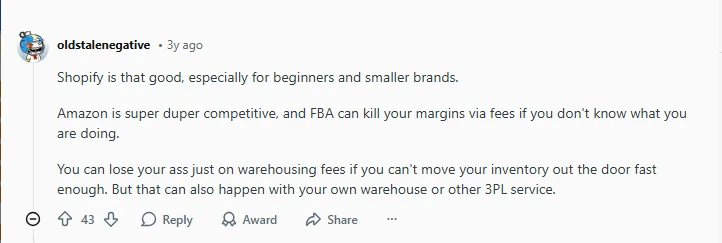
Next, you can customize your store by following the detailed checklist with simple instructions provided by Shopify. The three main phases are adding products, designing your store, and configuring settings.
Etsy ease of use
With Etsy, things are much easier. All you have to do is register an account, choose a store name, upload your products, enter billing details, and then you're good to go!
Uploading products is perhaps the most time-consuming step because it demands a lot of information. It's also the most important part since it decides whether your product stands out on Etsy (and steals customer attraction) or not.
Still, Etsy will guide you through the process and even give you suggested options for a store name. You don't need to build an entire store to start on Etsy. With a lot of workloads taken away, you can be an Etsy seller within hours.
See more: Shopify vs Custom-built Websites: Which one is suitable for you?
Design Flexibility – Shopify is Better
Quick verdict
Considering Shopify and Etsy's lack of design flexibility, Shopify still wins this battle with multiple free modern themes and the ability to customize the store design.
Shopify themes
With Shopify, you will have access to 200+ themes, both free and paid, on the Shopify themes store. Paid Shopify themes range in price from $150 to $480.
Depending on your business type, you can filter the industry and find the most suitable for your website.
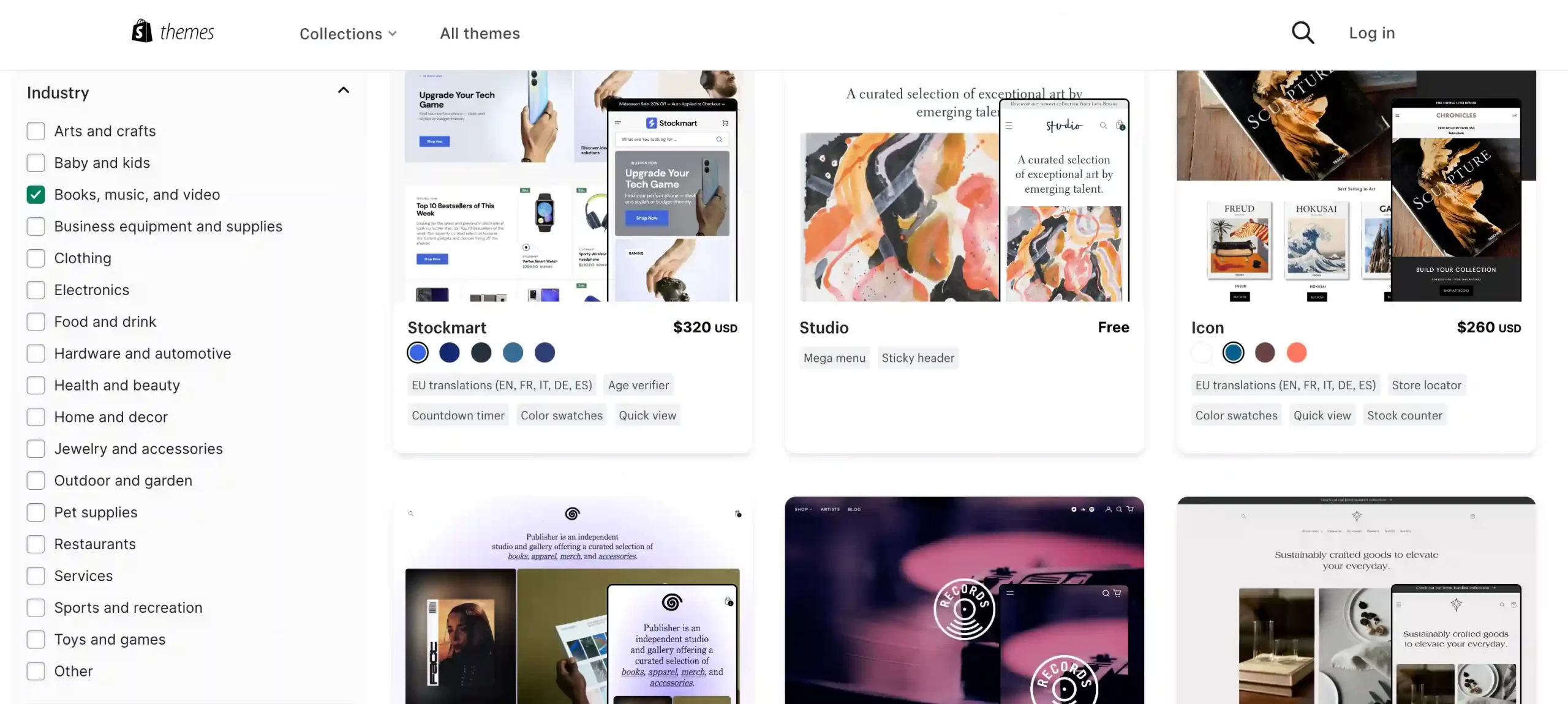
All Shopify themes are optimized for SEO and mobile usage. Theme switching is seamless; however, certain themes may require content reformatting.
You can customize your eCommerce website's design using a Template editor, which requires no HTML or CSS knowledge. You can also turn your HTML and CSS into a beautiful eCommerce website appearance using Shopify Liquid.
Etsy design flexibility
In contrast to Shopify, Etsy provides a streamlined and hassle-free approach to store design. Your shop will seamlessly integrate into Etsy's established layout and aesthetic. This lack of design interference can be a significant advantage, allowing you to focus on crafting and curating your products without the added burden of complex website design.
However, this convenience comes at the cost of customization.
Etsy's branding options are limited to your store name, logo, product images, and descriptions. While this streamlined approach ensures a consistent look and feel across the platform, it may not be ideal for sellers who want to create a truly unique and distinctive brand identity.
Very clear that, with these few options on Etsy, it’s hard to make your store the center of attention in terms of design.
See more: Shopify vs WordPress: Which Should You Use?
eCommerce Features – Shopify is Better
The availability of eCommerce features is necessary while deciding between selling on Shopify vs Etsy. It determines whether or not you will be able to manage your business and generate sales.
Quick verdict
When comparing eCommerce functionalities between Shopify vs Etsy, Shopify clearly outperforms Etsy, even though Shopify's greater feature availability may come with higher fees. Etsy's basic capabilities are sufficient if you wish to keep things simple and tiny.
Shopify eCommerce features
Even under Shopify's basic plan, the abundance of capabilities this all-in-one solution provides retailers is amazing.
Here's a rundown of some of the features that come included with each Shopify plan:
- Gift cards;
- Discount codes;
- Shopify POS;
- Multichannel selling;
- Abandoned cart recovery;
- SSL certificate;
- Dropshipping;
- Finance report;
- Fraud analysis;
- Blogging;
- Inventory and order management;
- Unlimited bandwidth and online storage;
- Shopify Mobile app.
Multi-channel selling is one of the most significant elements that can assist you in broadening your exposure to potential consumers.
Customers who had almost completed a transaction but left the checkout page (for unknown reasons) are reminded through abandoned cart recovery. This ensures that no sales slip through the cracks in your wallet.
You'll need an SSL certificate for safe transactions on your website. This will develop trust and credibility with prospects. Every package you choose will include SSL certificate authentication as a default.
Plus, beyond traditional eCommerce functionalities, Shopify has significantly expanded its capabilities with AI-powered tools and modern architecture support. Shopify Magic, the platform’s built-in AI suite, helps merchants generate product descriptions, refine marketing copy, suggest email content, and streamline repetitive tasks directly inside the admin dashboard. Basically, it reduces time spent on content creation while keeping messaging aligned with the brand tone.
Furthermore, from a technical standpoint, Shopify also supports headless commerce, allowing businesses to decouple the frontend from the backend using Shopify’s APIs and Hydrogen framework. This feature gives fast-growing brands more flexibility to build custom storefronts, improve site performance, and create tailored shopping experiences across web, mobile apps, and emerging channels.
Etsy eCommerce features
Etsy does a fantastic job at this point by providing you with toolkits to assist you in running your business efficiently.
You can manage orders, edit items, and respond to clients while on the road using the “Sell on Etsy app.” Etsy also offers marketing tools to help you increase traffic, expand your consumer base, and promote your brand.
Another features is performance analysis. It's critical for any business, and Etsy is a master at it. In fact, Etsy includes the analytics report function with every plan by default, which displays thorough details on performance trends and traffic sources.
See more:
- Shopify vs Amazon: Which Is Best For Selling Online?
- Shopify vs eBay – Comparing Key Features And Differences
- Shopify vs Salesforce Commerce Cloud: A Detailed Comparison
SEO & Marketing – Shopify is Better
Once you've taken stunning product photos and written appealing product descriptions, it's time to drive traffic to your store and show customers what you've got.
Quick verdict
In marketing, Shopify offers various tools to connect with customers. However, Etsy's popularity and existing customer base make it easier for customers to find your products.
Shopify SEO & marketing tools
Selling on an eCommerce platform like Shopify means attracting a steady stream of traffic to your online store. It's possible to promote your online business on Google and social media channels or, alternatively, harness the power of organic traffic through SEO techniques.
As luck would have it, Shopify offers numerous effective solutions. If to talk about what Shopify impresses me the most, I would say:
- Shopify Email to create and send professional email campaigns to subscribers with customizable templates and automation features.
- Shopify Inbox to manage customer conversations across multiple channels (email, chat, social media).
- Marketing Automations to automate repetitive marketing tasks like abandoned cart recovery, welcome emails, and customer segmentation.
Although it requires much effort and work, you'll have full control over how your brand connects with customers and creates effective marketing campaigns.
Similarly, from an SEO perspective, Shopify is also a strong choice.
To start with, the platform offers solid control over the SEO basics that directly affect rankings and click-through rates. You can customize your page titles and meta descriptions for product pages, collection pages, and content pages. Better yet, Shopify also allows you to edit URL handles, meaning you can keep URLs clean, descriptive, and consistent with your SEO plan.
Another advantage is image SEO. Shopify lets you add alt text to product images, which improves accessibility and increases your chance of showing up in Google Image results. For product-driven niches like jewelry, fashion, or home decor, image search traffic can actually convert surprisingly well when optimized correctly.
Etsy SEO & marketing tools
On the other hand, Etsy is a popular marketplace with about 90 million buyers each month, most of whom are repeat customers looking for vintage items or handmade products. This is why many eCommerce beginners choose to start with Etsy.
Etsy's marketing tools primarily focus on promoting your products within the Etsy marketplace to its existing audience. However, it's important to note that buyers don't search for your products specifically; instead, they search within Etsy's platform, which features around 100 million products.
And when it comes to SEO, Etsy works in a more marketplace-driven way. Instead of building SEO through full website control, your performance depends heavily on how well you optimize your listings for Etsy’s internal search engine. That means your “SEO priorities” shift toward elements like product titles, tags, categories, attributes, and listing quality.
Etsy has a strong advantage in one area: buyer intent and built-in discovery. Many shoppers go straight to Etsy when they want handmade or creative products, so ranking inside Etsy search can translate into sales quickly. Etsy’s ecosystem naturally pushes customers toward browsing, comparing, and purchasing within a familiar environment.
However, the trade-off is that Etsy SEO is more restrictive. You can’t fully control technical SEO elements like meta titles and descriptions in the same way you can on Shopify, and you also can’t shape the store structure or create SEO landing pages that target specific keyword clusters. Your store growth is mostly tied to how Etsy’s marketplace algorithm evaluates your listings, so whether it will perform well depends a lot on your strategies, as stated by many Etsy users.
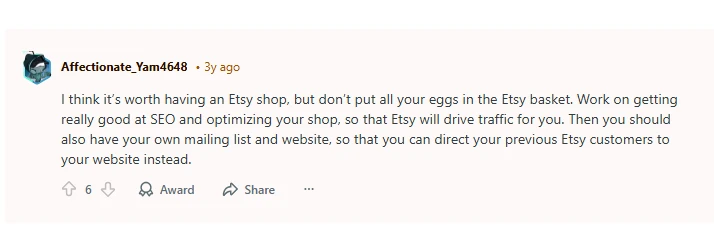
Another limitation is competition. Even if your product is great, Etsy is still a crowded place where many shops may target similar keywords. In practice, this means you’re not only competing on SEO—you’re also competing on price, reviews, shipping, and overall listing performance signals. So it’s possible to rank well, but it can be harder to maintain consistent visibility when new competitors enter the same niche.
On another note, Etsy has also started introducing AI-assisted features, which suggest better product titles, tags, or attributes to help sellers align with Etsy’s internal search algorithm. However, keep in mind that Etsy’s AI capabilities remain marketplace-centric: sellers cannot leverage AI for broader brand building, external SEO strategy, or custom storefront optimization in the same way they can with Shopify’s AI and headless infrastructure.
Scalability – It's a Draw
Quick verdict
Both Shopify Plus and Etsy Plus are capable of enabling your business's scalability. In terms of pricing, Etsy Plus is more affordable.
Shopify scalability
When your business grows bigger, you can easily upgrade your Shopify plan to Shopify Plus. This option will provide you with tons of superb features to scale up and flourish.
Click on the provided link for some key features of Shopify Plus in comparison with Shopify.
Etsy scalability
If you want extra tools to help your shop grow, you can pay for Etsy Plus, an upgraded version of Etsy.
Also, Etsy is an online marketplace, so you can sell your products both on your own website and on Etsy. This can help your business grow faster. If you use both Etsy and your own website, you can use a tool to connect them. This makes it easier to manage your products and orders.
Security – Etsy is Better
Quick verdict:
Etsy wins in terms of security by offering a simpler and more hands-off approach for sellers.
Shopify security features
So, as a hosted solution, Shopify offers essential security features like SSL certificates, Two-factor authentication (2FA), and Fraud analysis tools, as well as regular security audits and updates.
But as a Shopify store owner, you have some responsibility for maintaining the security of your store, such as:
- Choosing strong passwords and enabling 2FA.
- Keeping your Shopify software and apps updated.
- Implementing additional security measures like firewalls or security plugins.
That said, you still need to pick the right solution to control your Shopify store security.
Etsy security features
One thing that I really like is that Etsy takes care of all the techy security stuff like server maintenance, payment security, and fraud detection. This means sellers don't have to worry about this complicated stuff or spend extra money on security measures.
Another awesome thing is that Etsy has seller protection policies which cover things like unauthorized transactions, non-delivery of goods, and fraud. This gives sellers peace of mind in case they have any issues with buyers.
Lastly, unlike Shopify, Etsy handles most of the sensitive data and security stuff, so sellers are less likely to be affected by security breaches. This lowers the risk of losing customer data or having their shop compromised.
Help & Support – Shopify is Better
Quick verdict
Regarding the Help & Support option, it's Shopify easily outcomes its rival.
Shopify help & support
Basically, Shopify offer essential yet dedicated support methods for users:
- 24/7 phone support;
- Social media support;
- 24/7 live chat support;
- Community forum;
- Email support;
- Help Center;
- Video tutorials;
- Advanced specialist support.
Etsy help & support
With Etsy, the options are less diverse. You can find answers to your problems at the Help Center, where information is displayed very cleanly and clearly.
Etsy provides an active forum for engaging in discussions and receiving valuable advice from fellow users. While email and direct phone contact are available for support, it's important to note that sellers have encountered poor customer service in recent years.
Can You Have Both Shopify and Etsy?
Absolutely! Using both Shopify and Etsy for your business is a fantastic way to create a powerful synergy. It's super effective for expanding your online presence and reaching a wider audience through Etsy's popular marketplace.
With the Etsy Marketplace Integration app, you can easily integrate the Etsy marketplace with your Shopify store. What's the best part? You can try it out for free for the first seven days, and then it's just a small monthly fee.
Related Posts: Shopify Competitors: Comparing Top Alternatives for Ecommerce
Shopify vs Etsy: FAQs
Is it better to sell on Shopify or Etsy?
The answer depends on your need:
- Shopify is great for established brands, businesses with a wide range of products, and those looking for customization and scalability.
- Etsy is ideal for beginners, sellers of handmade or vintage items, and those wanting to step into a built-in audience and community.
When should I move from Etsy to Shopify?
Typically, you can consider moving to Shopify when:
- You want more control over your brand and store design.
- You're ready to scale your business and need advanced features.
- You want to sell a wider variety of products beyond Etsy's niche.
Is it worth having Etsy and Shopify?
Yes, you can utilize multichannel selling, such as Etsy and Shopify, to expand your reach and grow.
What is the downside on Etsy?
While Etsy offers a convenient platform, sellers have limited control over branding, customization, and scaling. Additionally, the marketplace is highly competitive, and success relies on adhering to Etsy's policies and marketplace dynamics.
Etsy vs Shopify: Final Verdict
With the above-mentioned differentiation pointed out and explained, we still can't give a one-size-fits-all answer to the question, “Is Shopify or Etsy better?” The answer mostly depends on how you want your online business to be.
If you want to build a unique and strong brand identity or expand your business to other sales channels, Shopify is the optional option.
On the contrary, Etsy is a perfect choice if you are on a tight budget. Anyone who registers for an Etsy account will automatically subscribe to Etsy's default plan, Etsy Standard, and pay no fee at all. Merchants with crafts, art, or handmade goods will also find Etsy a more suitable option for their business.
It’s not by chance they have earned such eradicating reputations after all these years. Shopify and Etsy shine in their own ways, but they are definitely not one-fit-all-size solutions. Therefore, there's time you want to switch to other platforms for the better sake of your business. And that’s when you can rely on LitExtension – #1 The World Shopping Cart Migration Expert.
Up to now, we have successfully migrated 280,000+ stores with 150,000+ customers worldwide. At LitExtension, we offer an advanced automated tool that transfers all your data securely and flawlessly from Etsy to Shopify.
For more information about how we can support your migration, feel free to contact our support team anytime you like, on a 24/7 basis.
You can also check out our LitExtension blog and join our community for more helpful eCommerce information.
Related Posts:
- Shopify vs GoDaddy: Which Wins the Crown?
- Shopify vs Squarespace: Which One Offers More?
- Shopify vs Square: Price, Online Store and POS Features
